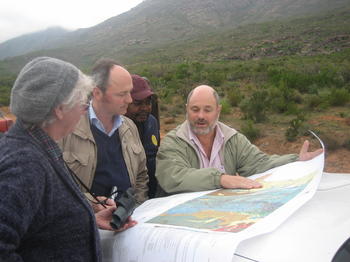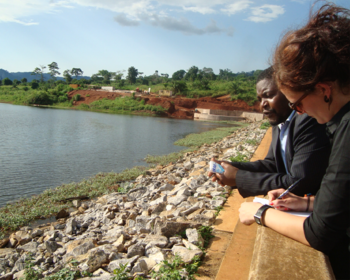Integrated Watershed Management Research and Development Capacity Building (IWM R&D CB)
Researchers and parcticioners during a joint field visit in South Afrcia
Image Credit: F. Becker
Field work of German and Cameroonian researchers in the Mefou Supérieure Watershed
Image Credit: R. Feumba

Enhancing collaborative research and development capacities of German and Sub-Saharan African partners on Integrated Watershed Management (IWM)
The situation in Africa shows the urgent need to improve research and development capacities for integrated watershed management, in order to respect the value of watersheds’ ecological functionality for keeping and increasing livelihood level. Experiences on land degradation highlight that maintenance of existing and ecological functioning watersheds needs less input than compared to the ambitious recovering process of heavily degraded landscapes. One bottleneck in building research and development capacities is the communication and knowledge transfer culture in Africa. Existing communities have different understanding of the challenges and opportunities of IWM, but interaction on knowledge exchange and strategies is too little.
Goals
The project aims at bridging the communication gap between scientists/researchers, practitioners/decision makers and the local population in the field of IWM.
The project is addressing these gaps by conducting joint research and development activities among all stakeholders in the three partner countries. These activities will create awareness of young German researchers on the need of fostering IWM measures in Africa. The most effective awareness raising takes place by direct, individual experience in the field. Therefore a team of PhD candidates and MSc students from Germany and the partner countries shall install ‘living laboratories’ in Cameroon, South Africa and Kenya.
Research plots within these catchments shall be established not only for research, but also for teaching purposes. Regular visits of the ‘living laboratories’ shall take place by the above mentioned research teams in order to assess research needs in close cooperation with the local population, to undertake research and to provide feedback to the population regarding research results.
Next to the activities on the spot in the three partner countries, an interactive e-Learning environment for IWM will be designed. This portal shall serve to:
- enhance knowledge exchange among IWM stakeholders
- advocate the need of enhancing IWM R&D measures with focus on socio-economic and geographical aspects on the African continent
- provide learning and teaching materials on IWM
- allocate a portfolio on IWM concepts and good practices
The project is carried out in the framework of the DAAD funded "Welcome to Africa" programme.
Partners





Project funded by:


